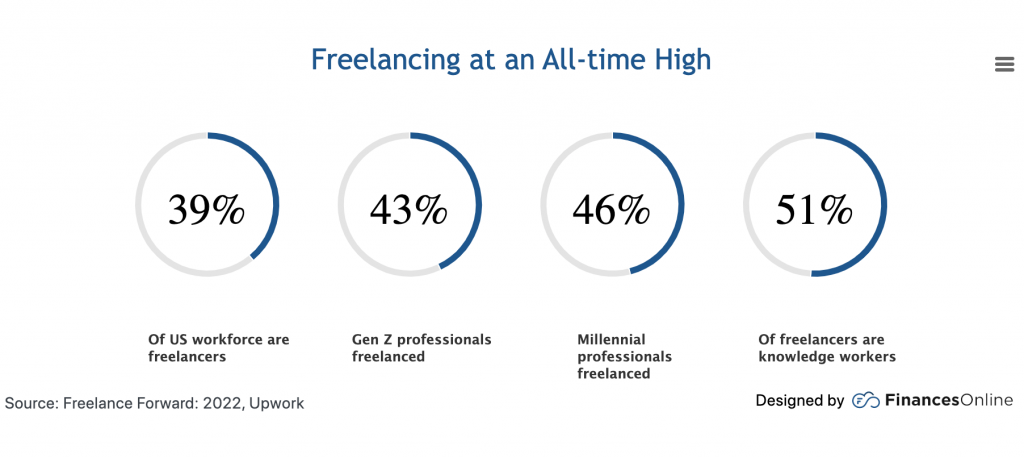
Source: Unsplash
While CEOs are preparing for a possible recession, small business owners are not seeing signs of a slowdown due to the tight labor market. A recent survey from The National Federation of Independent Business (NFIB) showed that 44% of small business owners reported job openings that were hard to fill.
On the other hand, the US Chamber of Commerce also published its own workforce report, stating that there are more than 10 million job openings in the country—but only around 6 million unemployed workers.
Reasons for the labor shortage vary, from the skills gap to an aging population and retiring workers. To address the problem, businesses have often turned to offering higher pay, flexible hours, and remote work options. But perhaps more business owners should consult the freelancing playbook.
Freelancing at an All-time High
The future workplace could be made up of professional side hustlers.
A new study revealed that freelancers now make up 39% of the entire United States workforce. That’s 60 million Americans who performed freelance work in the past 12 months. And if you think that’s just a lot of food delivery services, think again.
No longer is the gig economy limited to one-off tasks. Freelancing is becoming more attractive to skilled professionals and among the most educated. Twenty-six percent of American freelancers hold a postgraduate degree, up from 20% in 2021.
Moreover, nearly 31 million freelancers, or 51%, are knowledge workers. They provided services such as marketing, accounting, IT, computer programming, and business consulting. Technology and necessity have even allowed freelancing to benefit the nursing profession. An app dubbed “Uber for nurses” enables nurses to work when and where they want. Nurses can see open shifts, claim the ones they want, and get paid the same day after they finish the work.
Though not all businesses would be open to hiring freelancers for a variety of reasons, the overall perception of freelancing is shifting. Seventy-three percent of freelancers now say there’s a more positive view of freelancing as a career, up from 68% in 2021.
Freelancers are also a young workforce. Gen Z and Millennials are most likely to freelance. This year, 43% of all Gen Z professionals and 46% of all Millennial professionals performed freelance work.

Tapping the Independent Workforce
With workers increasingly preferring to freelance, the small business labor shortage could worsen. That’s unless businesses adapt to the labor marketplace. Tapping the growing pool of independent workers can help address the labor shortage, especially for seasonal or short-term positions.
Talent marketplaces like freelance platforms can make the search for the right freelancer less time-consuming. That’s because freelance platforms do all the candidate vetting, so the hiring process is streamlined. Employers not only save on recruitment costs but also get the assurance that they’re choosing among qualified talents.
Moreover, freelance platforms have become more diverse over the years. Some cater to a wide range of industries while others focus on specific types of positions. For example, there are platforms that cover a lot of creative and business management jobs but there are also those that target software-related jobs or marketing jobs only.
Using freelance platforms also makes communication between independent talents more efficient. Since exchanges happen in one online space, it’s easy to follow the progress of freelancers. Small businesses that also want to rehire freelancers in the future could easily contact them via the platform. Rates are also often transparent and fixed for projects, so employers can know exactly how much they’ll need to allot for payroll expenses.
Benefits of Hiring Freelancers
Small businesses looking to solve their worker shortage should consider some of the benefits that come from adding freelancers to their workforce.
For one, organizations that work with independent talent can pick from a larger talent pool. As a result, 84% of companies with a reserve workforce of freelancers said they are more confident in dealing with disruptions, compared to 69% of those who do not use freelancers.
Meanwhile, hiring managers also think there are many benefits to working with freelancers. Eighty-five percent believe that they can access specialized skills and expertise, 81% said they become more cost-efficient, and 79% agree that their business becomes more innovative working with freelancers.





















Leave a comment!